
FACULTY OF COMMUNICATION
Department of Cinema and Digital Media
CDM 433 | Course Introduction and Application Information
| Course Name |
Documentary Film Studio
|
|
Code
|
Semester
|
Theory
(hour/week) |
Application/Lab
(hour/week) |
Local Credits
|
ECTS
|
|
CDM 433
|
Fall/Spring
|
2
|
2
|
3
|
5
|
| Prerequisites |
|
|||||||
| Course Language |
English
|
|||||||
| Course Type |
Elective
|
|||||||
| Course Level |
First Cycle
|
|||||||
| Mode of Delivery | - | |||||||
| Teaching Methods and Techniques of the Course | DiscussionGroup WorkJuryField trip / ObservationLecture / Presentation | |||||||
| Course Coordinator | - | |||||||
| Course Lecturer(s) | - | |||||||
| Assistant(s) | - | |||||||
| Course Objectives | Documentary Film Studio aims to teach the students advanced practical skills in documentary filmmaking and introduce them contemporary narrative forms in this field. |
| Learning Outcomes |
The students who succeeded in this course;
|
| Course Description | This is a production-oriented course that teaches students how to develop an idea for a documentary film project, conduct background and field research, and plan and produce a short documentary film on the subject matter. Contemporary narrative forms and techniques in documentary filmmaking will be discussed along the various stages of the students’ projects. |
|
|
Core Courses | |
| Major Area Courses | ||
| Supportive Courses |
X
|
|
| Media and Management Skills Courses | ||
| Transferable Skill Courses |
WEEKLY SUBJECTS AND RELATED PREPARATION STUDIES
| Week | Subjects | Related Preparation |
| 1 | Documentary as Art: Creative Treatment of Actuality | |
| 2 | — Categories, Models, and the Expository and Poetic Modes of Documentary Film — Project Discussion: Initial Ideas | Barbash and Taylor, p. 17-22. Nichols, p. 142-171. Curran Bernard, p. 15-47. |
| 3 | — Observational, Participatory, Reflexive, and Performative Modes of Documentary Film — Project Discussion: Idea Development | Nichols, p. 172-212. |
| 4 | — Documentary Research — Project Discussion: Project Proposals | Rabiger, Part 5, p. 207-256. Curran Bernard, p. 113-129. |
| 5 | — Visual Ethnography and Ethnographic Approaches — Project Discussion: Preliminary Research | Barbash and Taylor, p. 35-69. |
| 6 | — Interview Techniques — Project Discussion: Production Planning | Curran Bernard, p. 137-174. |
| 7 | — Location Sound Recording — Project Discussion: Preproduction (Production Dossier) | Rabiger, Part 5, p. 264-277. |
| 8 | — Documentary Camerawork — Project Discussion: Production Reports | Film: Kirsten Johnson, Cameraperson, 2016 |
| 9 | — Lighting Techniques for Documentary Production — Project Discussion: Production Reports | Rabiger, Part 6, p. 287-348. |
| 10 | — Project Discussion: Raw Footage Review, Annotation and Organization | Rabiger, p. 407 – 443. |
| 11 | — Documentary Editing and Postproduction — Project Discussion: Raw Footage Review | Rabiger, p. 455 – 490. |
| 12 | — Project Discussion: Rough Cuts Review | |
| 13 | — Project Discussion: Fine Cuts Review | |
| 14 | — Project Discussion: Final Cuts Review | |
| 15 | — Final Cuts Screening, Review of the Semester | |
| 16 | — Review of the Semester |
| Course Notes/Textbooks | |
| Suggested Readings/Materials | — Sheila Curran Bernard, Documentary Storytelling, Second Edition, 2016, Focal Press ISBN: 978-0240808758 — Michael Rabiger, Directing the Documentary, Routledge, 2014 ISBN: 978-0367235574 — Ilisa Barbash, Lucien Taylor, Cross-Cultural Filmmaking: A Handbook for Making Documentary and Ethnographic Films and Videos, University of California Press, 1997 ISBN: 978-0520087606 — Bill Nichols, Introduction to Documentary, Second Edition-Indiana University Press, 2010 ISBN: 978-0253026859 — Brian Winston, The Act of Documenting: Documentary Film in the 21st Century, Bloomsbury Academic, 2017 ISBN: 978-1501309168 — Barry Keith Grant, Jeanette Sloniowski (eds.), Documenting the Documentary: Close Readings of Documentary Film and Video, New and Expanded Edition, Wayne State University Press, 2013 ISBN: 978-0-8143-3971-8 |
EVALUATION SYSTEM
| Semester Activities | Number | Weigthing |
| Participation |
1
|
15
|
| Laboratory / Application | ||
| Field Work | ||
| Quizzes / Studio Critiques | ||
| Portfolio | ||
| Homework / Assignments |
1
|
25
|
| Presentation / Jury |
1
|
30
|
| Project |
1
|
30
|
| Seminar / Workshop | ||
| Oral Exams | ||
| Midterm | ||
| Final Exam | ||
| Total |
| Weighting of Semester Activities on the Final Grade |
2
|
40
|
| Weighting of End-of-Semester Activities on the Final Grade |
2
|
60
|
| Total |
ECTS / WORKLOAD TABLE
| Semester Activities | Number | Duration (Hours) | Workload |
|---|---|---|---|
| Theoretical Course Hours (Including exam week: 16 x total hours) |
16
|
2
|
32
|
| Laboratory / Application Hours (Including exam week: '.16.' x total hours) |
16
|
2
|
32
|
| Study Hours Out of Class |
13
|
2
|
26
|
| Field Work |
1
|
20
|
20
|
| Quizzes / Studio Critiques |
0
|
||
| Portfolio |
0
|
||
| Homework / Assignments |
0
|
||
| Presentation / Jury |
1
|
20
|
20
|
| Project |
1
|
20
|
20
|
| Seminar / Workshop |
0
|
||
| Oral Exam |
0
|
||
| Midterms |
0
|
||
| Final Exam |
0
|
||
| Total |
150
|
COURSE LEARNING OUTCOMES AND PROGRAM QUALIFICATIONS RELATIONSHIP
|
#
|
Program Competencies/Outcomes |
* Contribution Level
|
||||
|
1
|
2
|
3
|
4
|
5
|
||
| 1 | To be able to have fundamental knowledge about narrative forms in cinema, digital and interactive media, and the foundational concepts relevant to these forms. |
X | ||||
| 2 | To be able to create narratives based on creative and critical thinking skills, by using the forms and tools of expression specific to cinema and digital media arts. |
X | ||||
| 3 | To be able to use the technical equipment and software required for becoming a specialist/expert in cinema and digital media. |
X | ||||
| 4 | To be able to perform skills such as scriptwriting, production planning, use of the camera, sound recording, lighting and editing, at the basic level necessary for pre-production, production and post-production phases of an audio-visual work; and to perform at least one of them at an advanced level. |
X | ||||
| 5 | To be able to discuss how meaning is made in cinema and digital media; how economy, politics and culture affect regimes of representation; and how processes of production, consumption, distribution and meaning-making shape narratives. |
|||||
| 6 | To be able to perform the special technical and aesthetic skills at the basic level necessary to create digital media narratives in the fields of interactive film, video installation, experimental cinema and virtual reality. |
X | ||||
| 7 | To be able to critically analyze a film or digital media artwork from technical, intellectual and artistic perspectives. |
|||||
| 8 | To be able to participate in the production of a film or digital media artwork as a member or leader of a team, following the principles of work safety and norms of ethical behavior. |
X | ||||
| 9 | To be able to stay informed about global scientific, social, economic, cultural, political, institutional and industrial developments. |
|||||
| 10 | To be able to develop solutions to legal, scientific and professional problems surrounding the field of cinema and digital media. |
|||||
| 11 | To be able to use a foreign language to communicate with colleagues and collect data in the field of cinema and digital media. ("European Language Portfolio Global Scale", Level B1). |
|||||
| 12 | To be able to use a second foreign language at the medium level. |
|||||
| 13 | To be able to connect the knowledge accumulated throughout human history to the field of expertise. |
|||||
*1 Lowest, 2 Low, 3 Average, 4 High, 5 Highest
NEWS |ALL NEWS
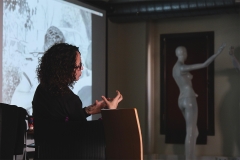
"Working with Found Footage" Workshop Organized with Zeyno Pekünlü
Artist, director, activist and academician Zeyno Pekünlü was the guest of CDM232: Digital Film Studio II.
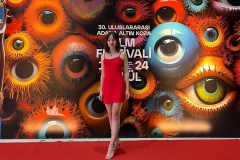
CDM senior year student Ecem has been selected to the Animation category at Adana Altın Koza Film Festival
CDM 4th-grade student Ecem Çörtle has been selected as a finalist in the National Student Films category of the 30th International Adana
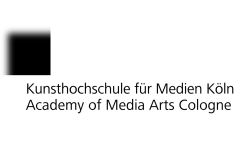
CDM graduate Eylül Berivan Kızılırmak has been accepted to the Cologne Academy of Media Arts
CDM graduate Eylül Berivan Kızılırmak has been accepted to the master's program at the Academy of Media Arts Cologne (Kunsthochschule für Medien Köln).
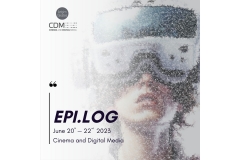
Traditionalistic CDM End of Year Exhibition EPI.LOG took place in FC Studios
Cinema and Digital Media End of Year Exhibition EPI.LOG 2023, organized as part of IUE Faculty of Communication Exhibition "FC-EX 2023", was
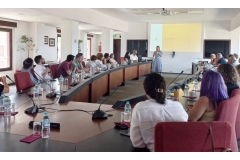
IUE Faculty of Communication Advisory Board members visited our Faculty and Studios on June 22, 2023
IUE Faculty of Communication Advisory Board members Andreas Treske, Ayşe Matay, Barbaros Görgü, Dilek Gappi, Elif Demirci İşleğen, Emine Uysal Berger, Murat
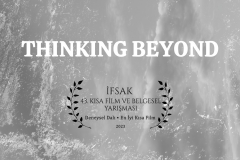
Ataberk awarded at the İFSAK 43rd National Short Film and Documentary Competition
Our third-year student, Ataberk Eyolcu, returned from the 43rd National Short Film and Documentary Competition of İFSAK (Istanbul Photography and Cinema Amateurs
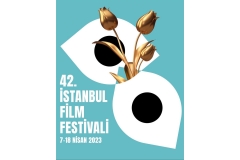
Our third-year CDM student Fikret Başar Kaya was at the 42nd Istanbul Film Festival
Our third year CDM student Fikret Başar Kaya participated as a Young Jury at the 42nd Istanbul Film Festival held on April
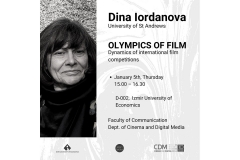
CDM hosted Dina Iordanova
Prof. Dina Iordanova gave a speech titled Olympics of Film: Dynamics of international film competitions on Thursday, January 5, 2023, in D002 at Izmir

